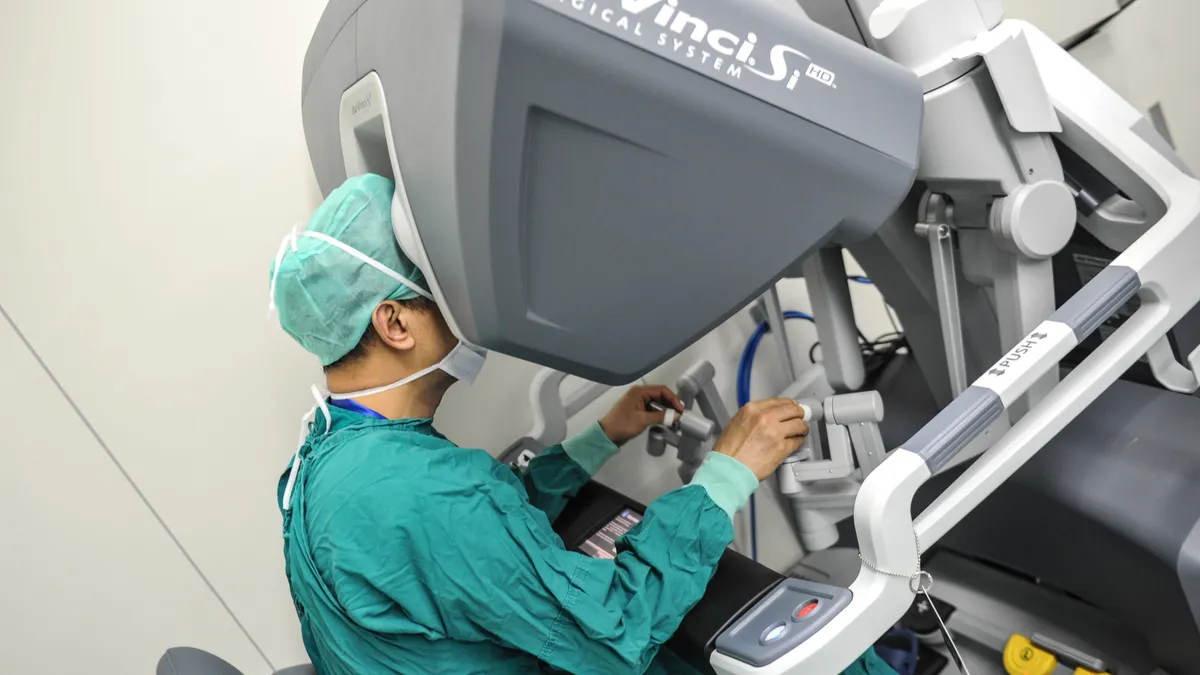Dive Brief:
- Intuitive Surgical’s large market opportunity and strong pipeline will enable it to deliver durable growth despite growing competition and regulatory challenges, according to analysts at William Blair.
- Medtronic, Johnson & Johnson and other competitors may take years to establish the “basic ecosystem” of products and services that they will need to win meaningful market share, the analysts argue.
- In a note initiating coverage of the company, the analysts say that Intuitive is well positioned to meet long-term growth expectations and retain market share because of the set of hardware, software, training and support it has built up over decades of investment.
Dive Insight:
The investor note provides an overview of the robotic surgery market and Intuitive’s place in it at a time when the sector is growing and changing. After years in which Intuitive had a de facto monopoly, the robotic surgery leader now faces emerging competition from companies such as Medtronic and J&J that have the resources to make sustained attacks on the market.
While the analysts acknowledge that “competition could hinder future growth,” they expect Intuitive to retain its leadership position “even as new entrants ramp up their competitive offerings.” That view is based on the belief that Intuitive’s platform “creates a sustainable competitive moat.”
“Intuitive’s broad ecosystem -- hardware, software, training, and support -- is critical to the company’s past and future success and should provide a durable edge,” the analysts wrote. “This ecosystem helped drive meaningful adoption of robotics while also making Intuitive a critical partner. Therefore, any competitors, in our view, would need to replicate not just da Vinci but also the entire ecosystem to take meaningful share.”
The statement echoes the conclusion analysts at BTIG reached after attending the Society of Robotic Surgery’s 2022 meeting. The BTIG analysts noted that Intuitive’s ecosystem of “advanced analytics, state-of-the-art imaging, virtual and augmented reality, cloud computing” and more make it harder for high-volume robotic surgeons and institutions to switch to emerging competitive systems.
As the William Blair analysts see things, Medtronic, J&J and the rest of the chasing pack “could take years” to establish the “basic ecosystem” they need to provide a package to rival that of Intuitive. J&J and Medtronic have already suffered delays in getting their soft-tissue robots, respectively called Ottava and Hugo, to the U.S. market. J&J recently laid off staff, and smaller firms such as Titan Medical have collapsed trying to crack the market.
The analysts think all companies, including Intuitive, could face regulatory delays, noting that the U.S. Food and Drug Administration “has seemingly become stricter on robotic surgery approvals recently.” While the trend could delay the approval of Intuitive’s next-generation system, the analysts view it as “another competitive moat for Intuitive since new competitors will need to invest more capital into clinical trials and expanded labeling to compete with da Vinci’s current use-cases.”












